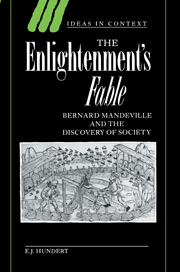Book contents
4 - A world of goods
Published online by Cambridge University Press: 23 November 2009
Summary
When, early in his literary career, Mandeville wrote The Grumbling Hive, he satirized his contemporaries for trumpeting their commitment to classical or Christian ideals of virtue while glorying in recent English prosperity. Employing the beehive as a symbol of productive activity for his own satiric purposes, he divided the poem into two parts. The first part stresses the economic benefits that follow when a society can accommodate a certain amount of (relatively unselfconscious) moral corruption amongst its members. In the second part, Mandeville contrasts this public felicity with an imagined society in which disastrous economic consequences follow when the lives of citizens are purged of immoral and immoderate behavior. Yet even in the wealthy hive, the “knaves” populating it are hypocrites who “boast … of their honesty” while engaging in duplicitous social practices. Mandeville's obvious and intentionally transgressive point in the poem is that commercial societies seem naturally to entail forms of artifice and imposture which should be understood as the moral price of commercial prosperity. As we have seen, he gave theoretical expression to this common concern amongst observers of British public life in the early eighteenth century, that, as one of them noted, “Greatness is so Theatrical, and the actors change so often that really I was at a loss where to fix.”
- Type
- Chapter
- Information
- The Enlightenment's FableBernard Mandeville and the Discovery of Society, pp. 175 - 218Publisher: Cambridge University PressPrint publication year: 1994

